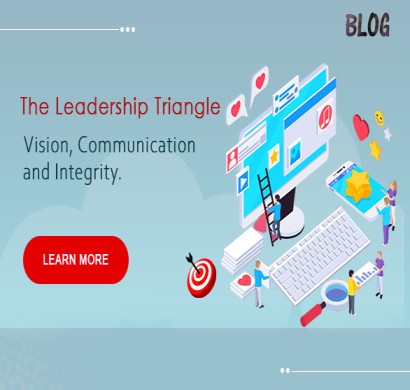
The Leadership Triangle - Vision, Communication, and Integrity
Effective leadership is a crucial ingredient for success in any endeavor. It sets the course, inspires action, and drives individuals and organizations towards their goals. Within the realm of leadership, three core elements stand out: vision, communication, and integrity. This article will explore the interplay between these components and shed light on how they collectively shape exceptional leadership.
1. The Power of Vision
The power of vision comprises defining the compelling vision and inspiring others to embrace the vision. Both of these are learned and discussed in detail given as follows.
1.1 Defining a Compelling Vision
A leader's vision serves as a guiding light, providing a sense of purpose, direction, and inspiration. A compelling vision encapsulates the organization's mission, values, and long-term aspirations. It paints a vivid picture of the desired future state and rallies stakeholders around a shared purpose.
To craft a compelling vision, leaders must first clarify their own goals and aspirations. They must then ensure that the vision resonates with the values and aspirations of their teams and stakeholders. Alignment between personal and organizational visions is key to fostering commitment and enthusiasm.
1.2 Inspiring Others to Embrace the Vision
A leader's ability to effectively communicate the vision is paramount. Clear, concise, and passionate communication helps individuals understand and embrace the vision. By sharing the vision with enthusiasm, leaders instill a sense of urgency and motivation in their teams. Moreover, they empower individuals to contribute their unique perspectives and skills towards the realization of the vision.
II. The Art of Effective Communication
A. Developing Strong Communication Skills
Effective leaders are skilled communicators. They actively listen to others, demonstrate empathy, and seek to understand different viewpoints. By mastering the art of communication, leaders can convey their ideas, expectations, and feedback clearly and persuasively.
To enhance communication skills, leaders should cultivate clarity, conciseness, and precision in their verbal and written communication. They should adapt their communication style to suit different audiences and contexts. By tailoring their message to resonate with the listener, leaders can ensure effective communication and understanding.
B. Building Trust and Collaboration
Open and transparent communication is the foundation of trust and collaboration within teams and organizations. Leaders who foster an environment of trust encourage honest and constructive feedback. They create space for diverse perspectives and ideas, recognizing that innovation often emerges from the exchange of different viewpoints.
Additionally, leaders should be adept at conflict resolution and promote a culture of constructive dialogue. By encouraging open communication, leaders foster a sense of psychological safety, enabling individuals to express their ideas and concerns without fear of judgment or retribution.
III. The Pillar of Integrity
A. Demonstrating Ethical Behavior
Integrity lies at the heart of effective leadership. Leaders must uphold ethical standards and moral principles in their decision-making processes. They act ethically, considering the interests of all stakeholders and the long-term impact of their choices. By demonstrating integrity, leaders set an example for others to follow.
Leadership integrity extends beyond personal behavior. It involves ensuring that the organization's policies and practices align with ethical standards. Leaders promote a culture of transparency, accountability, and ethical conduct by establishing clear guidelines and holding themselves and others accountable.
B. Building Trust and Credibility
Trust is a vital component of successful leadership. Leaders build trust by consistently acting in alignment with their values, commitments, and promises. They are reliable and follow through on their obligations. Trust is further reinforced through open communication, active listening, and a genuine interest in the well-being and growth of their team members.
Leaders who prioritize integrity foster credibility among their teams and stakeholders. By acting honestly, transparently, and authentically, they cultivate an environment where trust thrives, leading to enhanced collaboration, innovation, and organizational success.
IV. The Interplay of Vision, Communication, and Integrity
A. Vision as the North Star
Vision serves as a compass, guiding leaders and their teams towards their desired destination. It provides clarity and purpose, aligning efforts and motivating individuals. Effective communication of the vision ensures that everyone is on the same page, driving unity and commitment. However, without integrity, the vision can lose its authenticity and impact. Leaders must embody the values and principles of the vision to inspire trust and credibility.
B. Communication as the Bridge
Communication acts as a bridge between a leader's vision and its realization. Clear and open communication ensures that individuals understand their roles, responsibilities, and the steps needed to achieve the vision. Transparent communication builds trust, fosters collaboration, and ensures that ideas, concerns, and feedback are shared openly. Effective leaders align their communication with the organization's values and ethical standards to maintain credibility and engagement.
C. Integrity as the Bedrock
Integrity serves as the bedrock upon which exceptional leadership is built. Leaders who act with integrity are unwavering in their commitment to ethical conduct. They earn the trust and respect of their teams and stakeholders, creating an environment where honesty and transparency flourish. When integrity permeates the organization, it becomes a guiding principle for decision-making and actions, reinforcing the vision and driving sustainable success.
Conclusion
The triad of vision, communication, and integrity forms the cornerstone of exceptional leadership. A compelling vision provides direction and inspiration, while effective communication ensures clarity and alignment. Integrity, the bedrock of leadership, builds trust and credibility. By embracing and nurturing this triad, leaders can unlock their full potential, inspire others, and drive positive change in their organizations and beyond.





